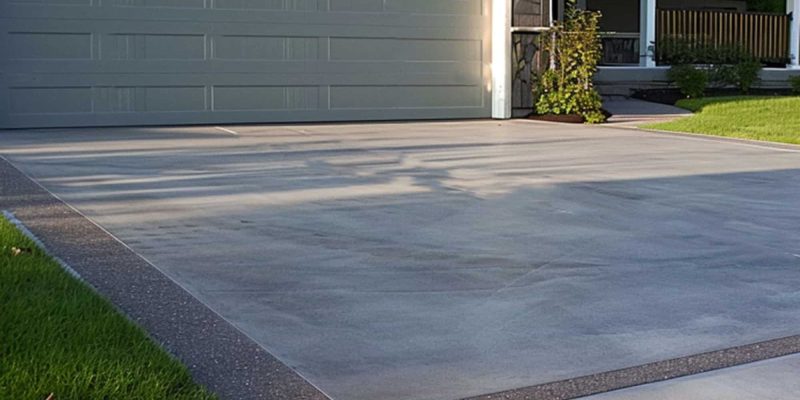Welcome to our homeowners’ guide on driveway materials! Whether you’re looking to install a new driveway or replace an old one, understanding your options is key. In this guide, we’ll dive into the world of concrete and gravel driveways, two popular choices that offer distinct benefits. Let’s explore what each material can do for your home, keeping things simple and informative.
Overview of Driveway Materials
When deciding on a driveway material, two popular choices stand out: concrete and gravel. Each has unique qualities suited to different needs and preferences.
Concrete Driveways:
- Durability: Concrete is known for its long-lasting nature. In Rockford’s varying weather, concrete stands strong against snow, rain, and temperature changes.
- Smooth Surface: It provides a stable and smooth surface, ideal for kids to play and easy on your vehicle’s tires.
- Customization: Concrete can be stamped or colored for a personalized look.
Gravel Driveways:
- Flexibility: Gravel is adaptable, making it a good fit for uneven terrain.
- Drainage: It offers excellent drainage, preventing water from pooling.
- Rustic Appeal: Gravel gives a natural, rustic look to your property.
Both materials have their place in Rockford’s residential landscapes. Concrete’s resilience makes it a go-to for a permanent, low-maintenance solution, while gravel’s versatility suits those looking for a more natural aesthetic.
Cost Analysis
Initial Costs and Long-Term Expenses
A key factor in choosing the right driveway material is cost. Let’s break down the expenses for both concrete and gravel driveways, so you can make an informed decision.
Concrete Driveway Costs
- Initial Cost: Concrete driveways tend to have higher upfront costs. In Rockford, the price can vary, but generally, you’re looking at a range between $4 to $8 per square foot. This includes materials and labor.
- Maintenance: Concrete is low-maintenance. Occasional sealing, which costs a few hundred dollars, is usually all that’s needed to keep it in good shape.
- Longevity: Concrete driveways can last up to 30 years or more, making the initial investment worthwhile.
Gravel Driveway Costs:
- Initial Cost: Gravel is more budget-friendly, with costs typically ranging from $1 to $3 per square foot.
- Maintenance: It requires more regular upkeep. You may need to replenish the gravel and smooth out the surface annually, which can add to the cost.
- Longevity: With proper maintenance, gravel driveways can also last for decades.
TIP
When considering costs, think about not only the initial installation but also the long-term expenses. While concrete has a higher upfront cost, its durability and low maintenance can be more cost-effective over time. Gravel, though cheaper initially, may require more ongoing care.
Installation Process
Laying Down the Basics
The installation process for each driveway type varies significantly. Here’s what you need to know:
Concrete Driveway Installation:
- Preparation: The site is cleared and leveled. A sub-base is then laid to support the concrete.
- Forming: Wooden forms are set up to define the driveway’s shape.
- Pouring Concrete: Concrete is mixed and poured into the forms, then leveled and smoothed.
- Curing: The concrete needs several days to cure. Avoid walking or driving on it during this time.
Gravel Driveway Installation:
- Preparation: Similar to concrete, the area is cleared and leveled.
- Laying the Base: A layer of larger stones is laid down for stability.
- Adding Gravel: Smaller gravel is spread over the base layer and compacted.
- Maintenance: Over time, you’ll need to add more gravel and level the surface as needed.
Concrete installation is more complex and usually requires professional help, while gravel driveways can be more of a DIY project.
Maintenance and Upkeep
Preserving Your Driveway’s Integrity
Regular maintenance is key to extending the life of your driveway, whether it’s concrete or gravel.
Concrete Driveway Maintenance:
- Sealing: Apply a sealant every few years to protect against weather and stains.
- Cleaning: Regular cleaning with a hose or pressure washer keeps it looking fresh.
- Crack Repair: Address any cracks quickly to prevent them from widening.
Gravel Driveway Maintenance:
- Raking: Regularly rake the gravel to keep the surface level and even.
- Weed Control: Apply weed killer or use landscaping fabric to prevent weed growth.
- Replenishment: Add more gravel as needed to maintain the driveway’s integrity.
Aesthetic Appeal
Your driveway is one of the first things people see. Here’s how each material fares aesthetically:
Concrete:
- Offers a clean, uniform look.
- Can be stamped or colored for a unique appearance.
Gravel:
- Provides a natural, rustic charm.
- Variety in gravel types allows for customization.
Environmental Considerations
Eco-Friendly Choices for Your Driveway
Environmental impact is an important consideration:
Concrete:
- Less porous, meaning it doesn’t allow as much water to seep into the ground.
- Can be made more eco-friendly with additives or permeable options.
Gravel:
- Excellent for drainage, reducing runoff.
- A natural material with a lower carbon footprint.
Pros and Cons
Weighing Your Options
Concrete Pros:
- Durable and long-lasting.
- Low maintenance.
- Sleek appearance.
Concrete Cons:
- Higher initial cost.
- Prone to cracking in extreme temperatures.
Gravel Pros:
- Cheaper to install.
- Good drainage.
- Natural look.
Gravel Cons:
- Requires more maintenance.
- Can be messy in wet conditions.
Choosing the Right Material for Your Home
Consider your budget, maintenance willingness, and aesthetic preferences. Think about your property’s drainage needs and how the driveway will be used.
Future Trends and Innovations
Innovations in driveway materials include permeable concrete for better drainage and eco-friendly options. Gravel driveways are seeing improvements in stabilization techniques.
Choosing the right driveway material is a balance of cost, maintenance, and aesthetics. Whether it’s the sturdiness of concrete or the natural look of gravel, the right choice depends on your individual needs and preferences. We hope this guide helps you make an informed decision for your Rockford home.

